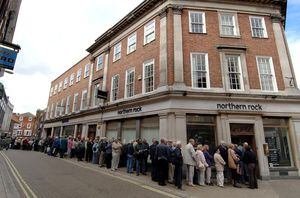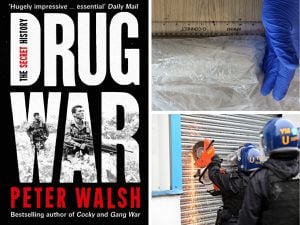Between a Rock and an even harder place
Ten years ago today long queues were forming outside branches of the Northern Rock, the former building society turned bank that had become notorious for its 125 per cent mortgage.

The previous evening the BBC's Business Editor, Robert Peston, had revealed Northern Rock was in trouble and being bailed out by the Bank of England.
It was the public first sign in the UK that something was seriously wrong with the economy.
Northern Rock was lending to housebuyers with money it was borrowing on the international markets, but that money was drying up as panic grew over the so-called sub-prime mortgage crisis in the US.
In America people with little or no hope of repaying their mortgages were being lent money to buy homes. Called ninjas - no money, no jobs and no assets – these essentially worthless loans were being bundled up and sold on the international money markets. It was a huge pyramid scheme that was about to collapse, taking the global economy with it.
In the UK banks were lending at a ferocious rate – household debt was at an all-time high – and also engaging in risky deals to keep expanding. Royal Bank of Scotland, under its chief executive Fred 'the Shred' Goodwin, was prepared to pay $71 billion for Dutch bank ABN Amro, a price hugely inflated after a bidding war with rival bank Barclays.
Risky 'casino' bank deals, risky lending and unsustainable levels of debt, both public and private, came together in a toxic cocktail that created what some now call the Great Recession.
Thousands lost their jobs, their savings and even their homes.
But Stuart Farquhar, senior lecturer in the department of finance, accounting, systems and economics, at Wolverhampton University, says it could have been worse.
"The reason why the recession was not has bad as it might have been was because Gordon Brown and Alistair Darling (the Prime Minister and Chancellor of the Exchequer at the time) took some pretty strong action at the time," he said.
Northern Rock was privatised in January 2008 and the Bank of England had to lend £61.2bn to RBS and HBOS to bail them out later that year. HBOS was rescued in a takeover by Lloyds, brokered by the government.
Gordon Brown lost the General Election in 2010,replaced by a Coalation and later a Conservative Government which both put an emphasis on cutting public sector debt and the nation's deficit.
But Stuart Farquhar says that approach has not made our economy any safer today than it was a decade ago. And ordinary people's finances may be even more at risk.
And that is because all the steps over the last 10 years, such as banks ringfencing high street banks to protect them from riskier investing banking, have largely ignored the growing mountain of private debt.
While no-one is handing out 125 per cent mortgages any more, 100 per cent mortgages have returned over the last year or so. Credit card debt has risen 18 per cent over the last three years to £68 billion, according to the Bank of England.
The average British household had unsecured debts amounting to £13,200 at the end of 2016, just below the £13,300 level at the end of 2008. In the 12 months to June, consumer debt rose another 10 per cent, passing the £200 billion level for the first time since the eve of the financial crisis.
And there is increasing worry over the so-called 'car loans bubble'. Four fifths of new cars last year were bought through Personal Contract Purchase (PCP) deals, usually through finance companies linked to car manufacturers.
Household debt including mortgages as a proportion of household income rose from 95 per cent in 1997 to 160 per cent before the credit crunch. Since then it has never fallen below 140 per cent and is now on the rise again.
Stuart Farquhar said: "We live in a debt-fuelled consumer society. That is the root problem and it hasn't been tackled.
"People have been encouraged to spend more but we have not had a real pay increase in the last 10 years. In real terms people's income has actually been falling. We have people taking out loans, not to fund unnecessary luxury consumption, but to pay for day-to-day consumption, such as clothing."
A key tool used to try and tackle the financial crisis was quantitative easing, which saw the Bank of England pump £435 billion into the economy through the banks and bond markets.
"It would have been more effective to use to it reduce private debt," said Stuart. "If you gave people £10,000 each to reduce their levels of debt it would have had a bigger impact and would probably have been cheaper in the end."
Part of the problem, says Stuart Farquhar, is the huge influence of the UK's financial sector on public policy over the last 30 or 40 years. "It has effectively captured government policy, so most policy is done for the benefit of the financial sector. It seems there is quite an incestuous relationship between the banks and politicians."
The bottom line, says Stuart: "People's money is probably not safer today than it was 10 years ago."
Rather than simply the first public sign of the coming crisis, Northern Rock was a huge red flag on a national addiction to debt. And that addiction hasn't abated.
Early post-credit crunch attempts to encourage saving rather than borrowing have foundered on the rocks on historic low interest rates – cut to 0.5 per cent in March 2009 and are now at 0.25 per cent. Thousands have seen their savings nest-eggs steadily eroded over recent years.
Low interest rates have encouraged more people to take on debt. But when interest rates start going up again, how many families will be able to cope with the higher payments?
As a result, with its dependence on consumer spending supported by debt, our economy is currently "very fragile", says Stuart Farquhar. He believes another financial crisis is inevitable – "within the next decade would be my best guess" – and this time we are in a far worse position to deal with it.





